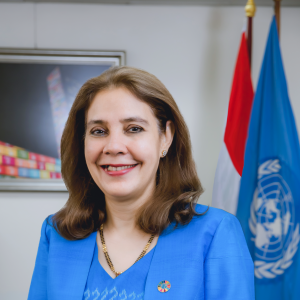3 - 7 February 2025
Jakarta, Indonesia
Ibu Pudji Ismartini, Deputy for Methodology and Statistics Information, BPS,
Bapak M. Habibullah, Deputy for Production Statistics, BPS
Prof Setia Pramana, Vice Director for STIS Statistics Polytechnic
Participants from the Statistical Offices of Kazakhstan, Malaysia, Thailand, Timor Leste, Türkiye, and Vietnam,
Data Scientists from BPS, the STIS Statistics Polytechnic, line ministries and universities,
Colleagues, Ladies, and Gentlemen,
It is my pleasure to welcome you to the workshop on machine learning for official statistics hosted by Indonesia in its capacity as the regional hub on big data and data science for Asia and the Pacific.
I know we have a room full of statisticians and data experts, including colleagues from DESA and ESCAP, with a love for numbers, methodologies and analyses.
This workshop is an excellent opportunity to enhance your capacities and upgrade your skillsets on machine learning techniques, which I believe will be critical as governments are rapidly seeking to transform policymaking premised on real-time evidence.
Cutting-edge technologies through machine learning will contribute greatly to SDG acceleration and green transformations across the region.
Importantly, machine learning is not just a technological trend but a fundamental transformation in statistical methodologies.
Indonesia is an ideal setting for this workshop on machine learning.
As a G20 member with a robust economy and a forward-looking development agenda, it has been using this technology to test and scale up real-time information in support of national priorities.
BPS has used it to assess current rice production rates based on satellite imagery, to estimate the geographic distribution of poverty using nightlight, and to analyse mobile positioning data to measure urban commuters, and tourism statistics.
As statisticians you have your hands full with plenty of data.
To track socio-economic trends, you have to tap into multiple data sources such as government censuses and administrative data from line ministries.
In the face of such data overload there is a growing demand by political leaders for integrating various sets of statistics and data analyses into one single set.
Leveraging machine learning will help statisticians like you make this a reality by speeding up analysis, revealing hidden patterns in reams of data, eliminating anomalies and avoiding duplications.
Machine learning models trained to make precise predictions will also enable you to provide deeper insights into future trends and outcomes. This will assist in managing risks, forecasting trends, and making proactive decisions.
Just as importantly, machine learning will lead to considerable efficiency gains and expedite more targeted policy interventions.
I have seen its benefits first-hand at the Ministry of Health’s Emergency Operations Centre in Jakarta recently.
The centre leverages machine learning to track health-related emergencies across the country in real-time in support of prompt responses to health emergencies, be it natural disasters or disease outbreaks among people or livestock.
Similar systems can be deployed to assess complex census and administrative data for interventions in reducing maternal deaths, boosting social protection for specific demographics or other crucial agendas in line with the SDGs.
However, we must approach technological changes with care to ensure reliability and transparency.
We can do this by lowering margins of error in statistical products, which will boost public trust in them.
This workshop provides a learning opportunity for this.
It will also allow us to connect with colleagues from six different countries, widen our professional networks, deepen our partnerships and form enduring friendships.
Thank you.






